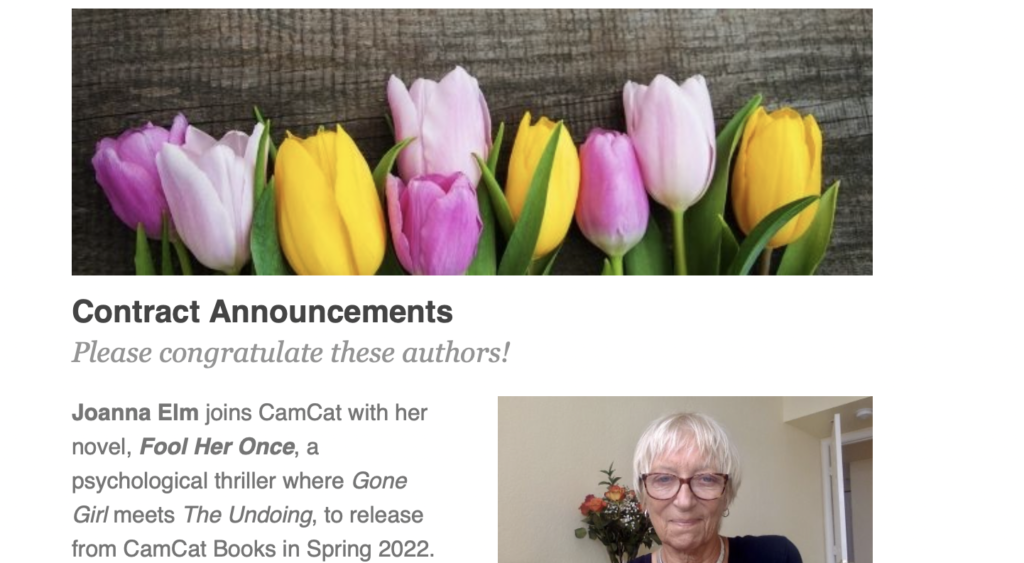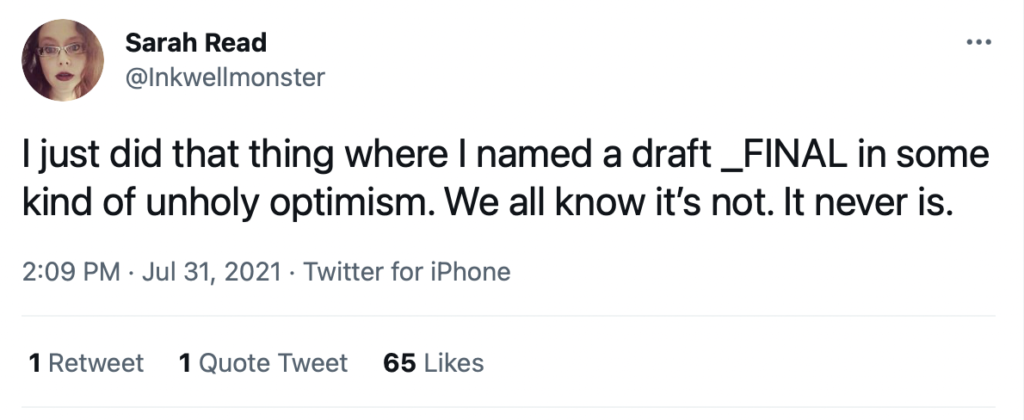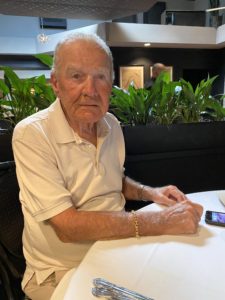You’d think coming into the final stretch of the publication process would be a piece of cake for an author. That’s the stretch where you make your final edits and revisions— just before you hand over your novel to copy editors and proof readers. That’s about where I am with my thriller Fool Her Once which is to be published next Spring by CamCat Books.
 Final edits and revisions are minor stuff, you say, right? After all a publisher has said she loves it. She’s announced its publication date; compared it to the best of best thrillers in your genre. The editorial director loves it.
Final edits and revisions are minor stuff, you say, right? After all a publisher has said she loves it. She’s announced its publication date; compared it to the best of best thrillers in your genre. The editorial director loves it.
No Such Thing As “Final”
Sure, there were some general concerns the publisher wanted addressed once I signed the contract. There always are. I worked on addressing those and turned in a final revised manuscript
Not so fast. By now, even my non-writing friends know there’s no such thing as “Final” —until that sucker is for sale in bookstores and on Amazon. Authors and writers definitely know it.

So, I knew once my editor made a deep dive into the final revised manuscript there would be a last round of “polishing”, a little more tweaking, some tightening here, deletes there, minor edits all over.
Oh and by the way, she emailed, the ending is still too complicated. Needs a re-work. And, could you please have it all back to us in two weeks?
Two Weeks In Hell? Not A Problem.
I like to think I work better under pressure. I’ve worked with deadlines all my life —ever since my first newspaper reporting job straight out of college. So, I buckled down.
Two weeks of hell was much tougher on my husband, Joe –although he never complained once. He just kept moving the printout of the current cover favorite for Fool Her Once, pinning it up in various strategic locations in the house. I could not have gotten through those two weeks without him.
 I took over the TV room (because this summer that’s my favorite place to revise) so Joe had nowhere to sit to watch big-screen TV. He didn’t say a word.
I took over the TV room (because this summer that’s my favorite place to revise) so Joe had nowhere to sit to watch big-screen TV. He didn’t say a word.
I spread out my chapters and notes all over the house and backyard. Joe grit his teeth but said nothing.
I had no time to cook or prep meals, not even to make toast. That was a big deal. I love cooking, Joe loves my cooking. Lunch is our main meal of the day; that’s our together time. Occasionally, we’ll dine out. Forget about that.
 For two weeks, Joe has made a daily takeout run, instead. Cooked shrimp from Cor-J’s, lobster salad from Sundays, pizza or chicken parmigiana or spaghetti and meat balls from Francesca’s. He’d pick it up, I’d throw it on a plate. We’d scarf it down, I’d throw the dirty dishes in the sink and go back to work.
For two weeks, Joe has made a daily takeout run, instead. Cooked shrimp from Cor-J’s, lobster salad from Sundays, pizza or chicken parmigiana or spaghetti and meat balls from Francesca’s. He’d pick it up, I’d throw it on a plate. We’d scarf it down, I’d throw the dirty dishes in the sink and go back to work.
It had to be done.
Endings Are Difficult
While I’ve had a very clear idea about my antagonist for a long time, I wasn’t always sure how things would end for him. Once he became a three-dimensional person with redeeming qualities, it was difficult to conjure up a totally traditional ending where the bad guy gets punished — and usually dies.
 Think Hannibal Lecter: Did we want him to be recaptured and sent back to the deepest, darkest prison for the criminally insane? Or were we cheering because he had escaped and could punish and torture the truly despicable warden of that institution? Who can forget that classic movie ending in Silence of the Lambs: “I’m having an old friend for dinner, Clarice.”
Think Hannibal Lecter: Did we want him to be recaptured and sent back to the deepest, darkest prison for the criminally insane? Or were we cheering because he had escaped and could punish and torture the truly despicable warden of that institution? Who can forget that classic movie ending in Silence of the Lambs: “I’m having an old friend for dinner, Clarice.”
So, throughout most of my early drafts, I was never quite sure of my antagonist’s fate. At one point I even considered writing a “Choose your own ending” novel: “If you like this guy, turn the page; If you think he deserves to die proceed to page 350.”
Balanced Story
I wasn’t bothered too much since Story guru, Robert Mckee said in the first of his seminars which I attended: “Build a story without knowing where you are going.” He did not mean pantster style. He meant “a smart writer goes out of the way to build the power of ideas vs. counter ideas.” Be like a lawyer who can articulate both sides of an argument. In other words “the story is so balanced” you don’t know how it’s going to end. And, if you, the writer don’t know exactly how it’s going to end, the assumption is that reader won’t either.
Clever Ending?

Then, one day I came up with an ending which I thought was a clever ending. But it wasn’t quite right. My publisher said I needed to change it. And, when I did, my editor, Helga commented that it was still too “complicated.” No problem. I trust her judgment. I believe that it always takes another eye, and an editor shouldn’t be afraid to tell you when something just isn’t working.
I’m not the only author who has changed an ending thanks to her editor. Lisa Jewell, author of the bestseller, Then She Was Gone describes here how the editors of that psychological thriller told her the happy ending she’d written for her kidnap victim just didn’t work. She changed it. The novel remained on the bestseller lists for more than a year.
Last Four Chapters
With two weeks to go, I had my work cut out for me. So, Helga and I worked through it together. I had suggestions; she had suggestions. I wrote out a scene by scene summary of the last four chapters — which she approved.
I rewrote the last four chapters. I was happy. I emailed them to Helga. I said:“I think this really works.” She replied: “Oh, I think it works very well! Awesome!”
Now. I had one week to fix everything else. Compared to nailing the ending, it was minor: enhancing a key scene, deleting a character that didn’t add anything to the plot, tightening paragraphs — and deleting about 200 adverbs.
No, seriously, really, definitely, actually, I needed to remove them all.
And, I did.
Can’t wait to read the “final” product 🙂
Getting closer, Eldon. Today Fool Her Once went to the copy editor at CamCat Books!
Awesome!!
Getting close. I’m liking how serious this publisher is in pushing you to make the story even better. Good sign they love your story.
I know, isn’t that something! Helga, my editor at CamCat Books has never stopped pushing me. Tonight, she finally let it go to the copy editor. I’m over the moon!